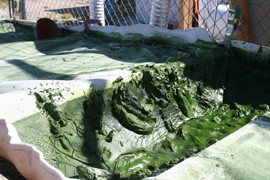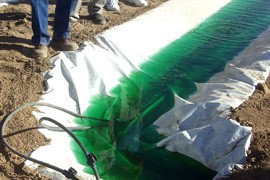Cronkite News has moved to a new home at cronkitenews.azpbs.org. Use this site to search archives from 2011 to May 2015. You can search the new site for current stories.
Bills aim to help establish Arizona as algae-farming center
PHOENIX — Anticipating a day when Arizona becomes a leader in producing algae for biofuel, a Tucson lawmaker is pushing to have algae farms and related facilities defined — and taxed — like any corn field or packing plant.
Rep. Matt Heinz, a Democrat, has introduced two bills that he said will allow for the growth of algaculture, or algae farming.
“If we don’t, it could become cost-prohibitive to expand algacultivation,” Heinz said.
On Monday, the House Energy and Natural Resources Committee endorsed HB 2225, which would expand the definition of agricultural lands to include algaculture research, development and commercial production on state trust land.
HB 2226, scheduled for a committee hearing Thursday, would expand the definition of agricultural real property for the purposes of taxation to incorporate algaculture. That includes research, development and commercial production of algae for biofuels or hydrogen.
The bills only cover the cultivation of algae, not the process of extracting oil, Heinz said.
Algae farming doesn’t yet have a strong presence in Arizona, though Arizona State University and University of Arizona researchers are working to develop the science both in their labs and in partnerships with local companies.
Laws promoting algaculture would open up Arizona’s agricultural landscape, create jobs and attract leading companies in the field, said Milton Sommerfeld, a professor who serves as co-director of ASU Polytechnic’s Laboratory of Algae Research and Biotechnology.
“Algae is a crop,” Sommerfeld said. “You have the same types of problems and challenges as you do with other crops. You’ve got to have good seed material and good technology to be able to process it. You have to have a place where you can grow it.”
Today’s research focuses on honing the energy potential of algae.
U.S. interest in algae began during the late 1970s, when an oil embargo forced the country to look for cheaper fuel sources. The research ramped up again five years ago, when the cost of gas spiked yet again.
With its abundant sun, flat farmland and mild climate, Arizona is an ideal site for the burgeoning algae-farming industry, Heinz said.
“We have this great gift of sun that doesn’t just help the solar panels, but also allows for photosynthetic advantages,” said Heinz, a hospital physician who first learned about algae farming at ASU Polytechnic’s laboratory.
Rep. Russ Jones, R-Yuma, who signed on as a primary sponsor of both bills, said it’s important to give the industry the same tax treatment as conventional farming.
“This is an area where Arizona is taking the lead, and we don’t want to lose it,” Jones said.
Rep. Frank Pratt, R-Casa Grande, chairman of the House Energy and Natural Resources Committee, cast the single nay vote against HB 2225, explaining that there currently are no large-scale, commercial algae operations for the bill to help.
“While I see the merit of this, I think it’s a little premature,” he said.
Sommerfeld said it’s possible that algae-based fuels could be sold at gas stations within a decade. However, he said, that depends on government and industry commitment to research.
“We’re growing algae at the Polytechnic campus in significant quantities, but nothing at the scale of what we’d need to make it commercially available and competitive,” he said. “There are perhaps 100,000 or more species of algae that have yet to be even looked at in detail.”








